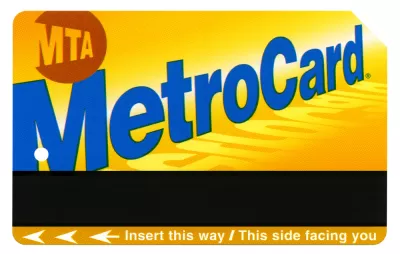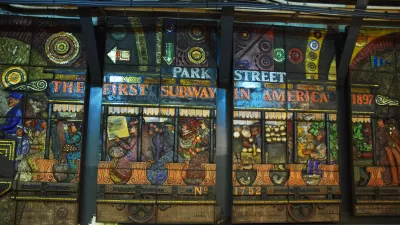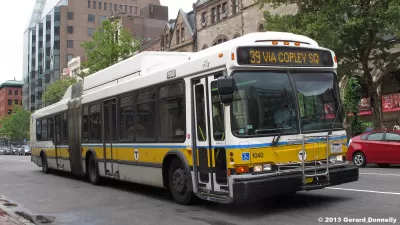A study from MIT seems to confirm that the cost of transit is depressing use of service by low-income residents, and that reduced fares help this population take the trips they currently don’t.

A randomized trial of Boston commuters showed that low-income transit users are more likely to use transit when they received a discount. The study separated a group of transit users into a group that got a discount and one that didn’t. “Unsurprisingly, people who paid half price for transit fares used transit more often: the group that received the discounted CharlieCard took, on average, about 30% more trips per week than the control group paying full price,” Christian MilNeil writes for Streetsblog Massachusetts. The findings suggest that ridership by low-income transit riders is suppressed by the cost of using services.
Interestingly, the ridership habits of the subsidized groups varied somewhat from those of other riders. "While transit agencies might be concerned that offering a discounted fare to lower-income riders might increase crowding, the study’s data show that lower-income households (with and without the discount) were actually more likely to ride during off-peak times, especially in the early-morning hours before 7 a.m.," Milneil writes. The study's authors think if the agency were to subsidize low-income riders, most of the ridership gain would be on buses and trains that currently have capacity.
FULL STORY: MIT Study: High Fares Limit Low-Income Households’ Mobility

Maui's Vacation Rental Debate Turns Ugly
Verbal attacks, misinformation campaigns and fistfights plague a high-stakes debate to convert thousands of vacation rentals into long-term housing.

Planetizen Federal Action Tracker
A weekly monitor of how Trump’s orders and actions are impacting planners and planning in America.

In Urban Planning, AI Prompting Could be the New Design Thinking
Creativity has long been key to great urban design. What if we see AI as our new creative partner?

Cal Fire Chatbot Fails to Answer Basic Questions
An AI chatbot designed to provide information about wildfires can’t answer questions about evacuation orders, among other problems.

What Happens if Trump Kills Section 8?
The Trump admin aims to slash federal rental aid by nearly half and shift distribution to states. Experts warn this could spike homelessness and destabilize communities nationwide.

Sean Duffy Targets Rainbow Crosswalks in Road Safety Efforts
Despite evidence that colorful crosswalks actually improve intersection safety — and the lack of almost any crosswalks at all on the nation’s most dangerous arterial roads — U.S. Transportation Secretary Duffy is calling on states to remove them.
Urban Design for Planners 1: Software Tools
This six-course series explores essential urban design concepts using open source software and equips planners with the tools they need to participate fully in the urban design process.
Planning for Universal Design
Learn the tools for implementing Universal Design in planning regulations.
Appalachian Highlands Housing Partners
Gallatin County Department of Planning & Community Development
Heyer Gruel & Associates PA
Mpact (founded as Rail~Volution)
City of Camden Redevelopment Agency
City of Astoria
City of Portland
City of Laramie





























